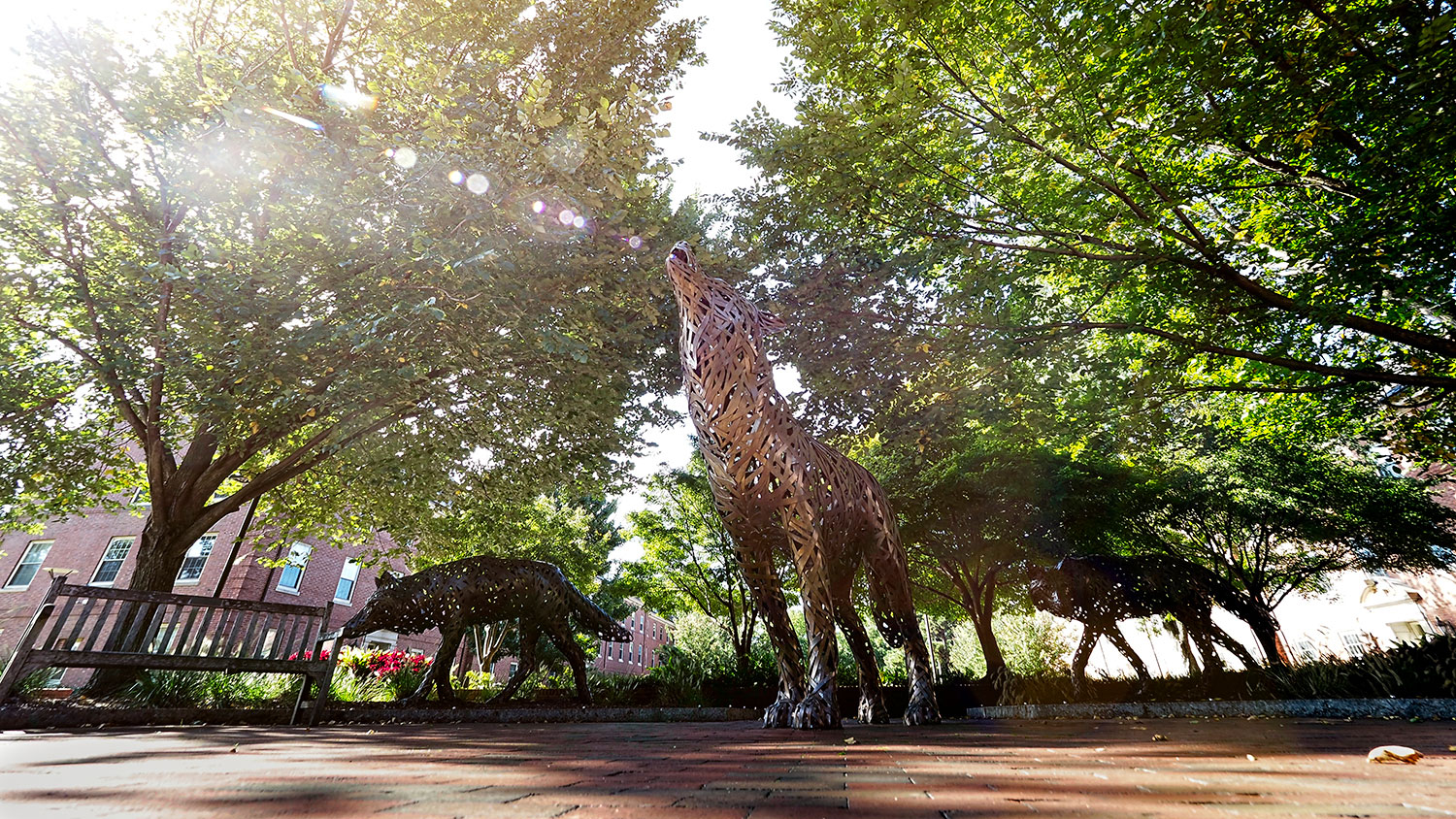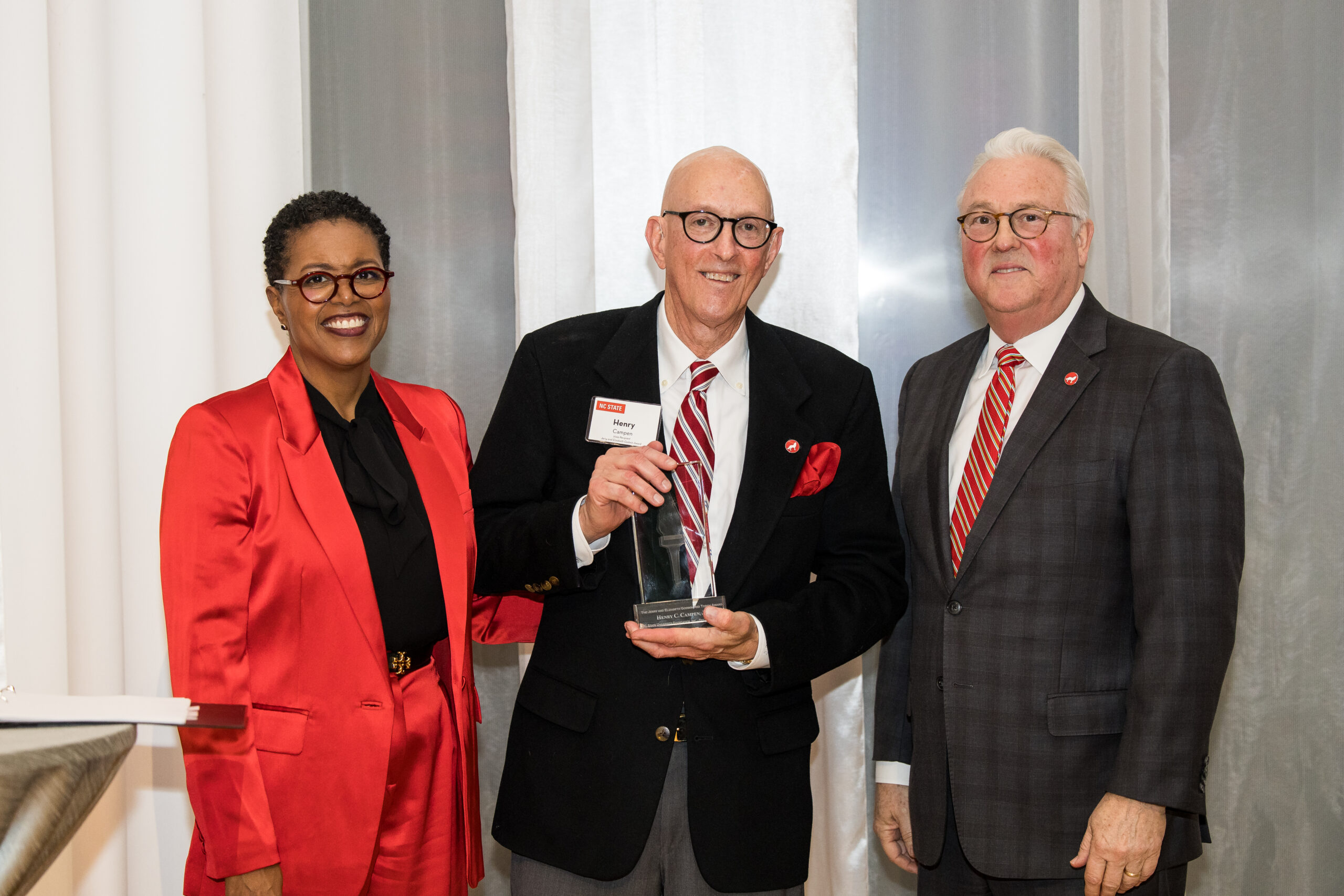Wilson College of Textiles Honors an Extraordinary Gift and an Extraordinary History
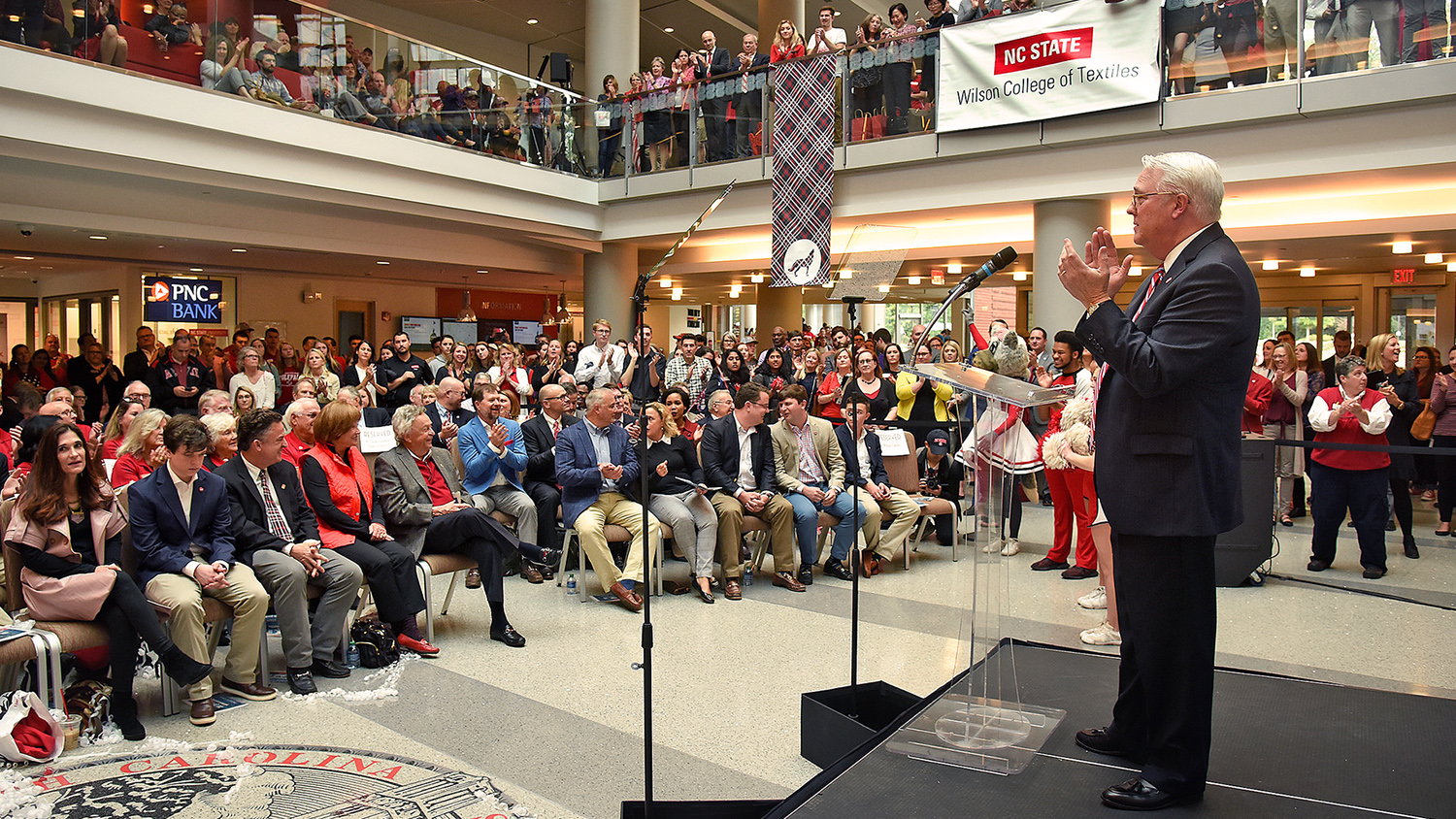
NC State University has received a $28 million naming gift benefiting its College of Textiles, Chancellor Randy Woodson announced this afternoon.
The contribution from Frederick “Fred” Eugene Wilson Jr., of High Point, and the Wilson family — which includes three generations of graduates from the college — will name the Wilson College of Textiles in perpetuity.
Textiles becomes the second named college at NC State along with Poole College of Management, which was designated as such in 2010 following a gift from Lonnie and Carol Poole.
The Wilsons’ gift was unveiled during the chancellor’s annual Fall Address and the university’s annual Red and White Week celebration. It’s part of NC State’s $1.6 billion Think and Do the Extraordinary Campaign.
“This is a historic day for NC State and a truly transformational gift for the College of Textiles,” Woodson said. “We are tremendously grateful to Fred Wilson and the Wilson family for their investment in our students, our faculty and our land-grant mission. Their amazing generosity means that the Wilson College of Textiles – the only college of textiles in the nation – will continue to be a vital, vibrant leader in education, discovery and practical application of innovation for years to come.”
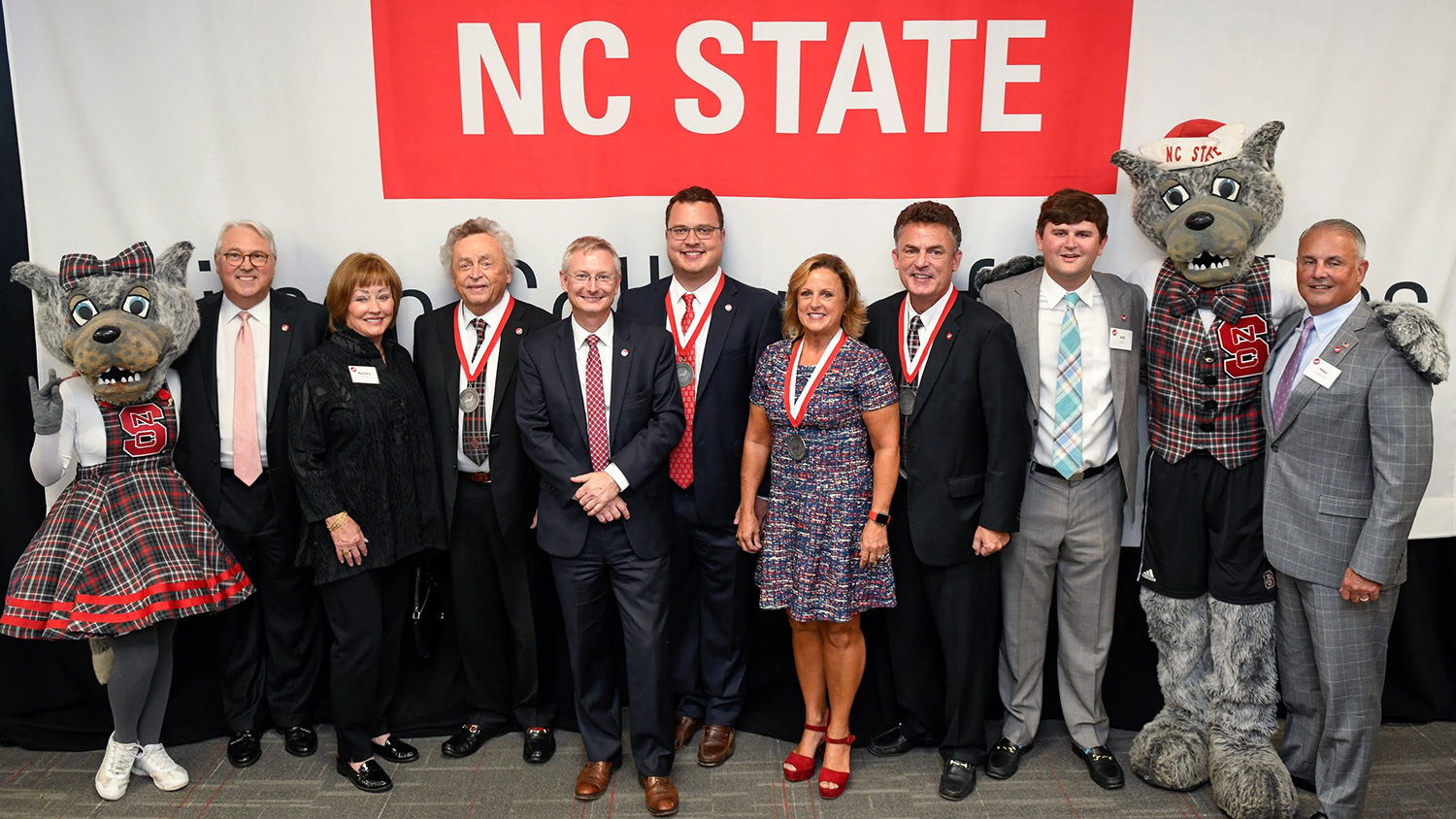
As an unrestricted gift to endowment, the Wilsons’ support will be channeled toward the college’s strategic priorities and greatest needs, from student scholarships and fellowships, to faculty funding and cutting-edge equipment.
“Textiles has been an important part of our university’s story, and North Carolina’s economy, for more than a century. As the industry has changed, NC State has been able to change along with it – to purposefully adapt, to innovate and to keep pushing forward,” Woodson said. “Our faculty has built expertise in a wide range of textile applications and specialties. The Wilson family’s gift will empower us to prepare students for success in a resurgent textile industry, inspire investment through key partnerships and initiatives, and make a real difference for our state and beyond.”
“We’re proud to have the support of a family with deep North Carolina roots and long ties to the college and to the textiles industry.” — Chancellor Randy Woodson
Fred Wilson graduated from NC State in 1961 with a bachelor’s degree in textile chemistry. He is a member of the university’s W.C. Riddick Lifetime Giving Society, with past support to areas including Textiles, athletics, Sigma Phi Epsilon and the Alumni Association.
His children, Frederick “Rick” Eugene Wilson III (’87), of Signal Mountain, Tennessee, and Elizabeth Creswell “Cres” Wilson Calabrese (’89), of Georgetown, South Carolina, also earned degrees in textile chemistry. Fred’s grandson and Rick’s son, Frederick “Rede” Eugene Wilson IV, of High Point, is a 2016 alumnus with a degree in polymer and color chemistry.
All four work for their family-owned and -operated High Point-based company, Piedmont Chemical Industries. Fred serves as chairman of the board for the firm founded in 1938 by his father, the late Frederick Eugene Wilson Sr.
The Wilsons said the gift, the college’s largest ever, honors NC State’s positive impact on their family and their business’ success, and underscores their confidence in a renewed U.S. textile industry. They want to support and ensure the college’s ongoing importance as a leader and an economic driver.
“When we were talking to the chancellor about the college and about it being the only college of textiles remaining in the U.S., a light bulb really went off,” Fred Wilson said. “Somebody’s got to draw a line in the sand. We’ve got to remember what got us here and recognize where we can go in the future. I’m happy that we could be the ones to do that.”
Leadership for North Carolina
NC State’s first textiles professor was hired in 1899, not long after the university opened to students. As the program developed by 1925 into the School of Textiles, based in Tompkins Hall, it rapidly developed a reputation as an expert in textiles teaching, research and service. The school became the College of Textiles in 1987, and shifted from its longtime headquarters in Nelson Hall to Centennial Campus four years later.
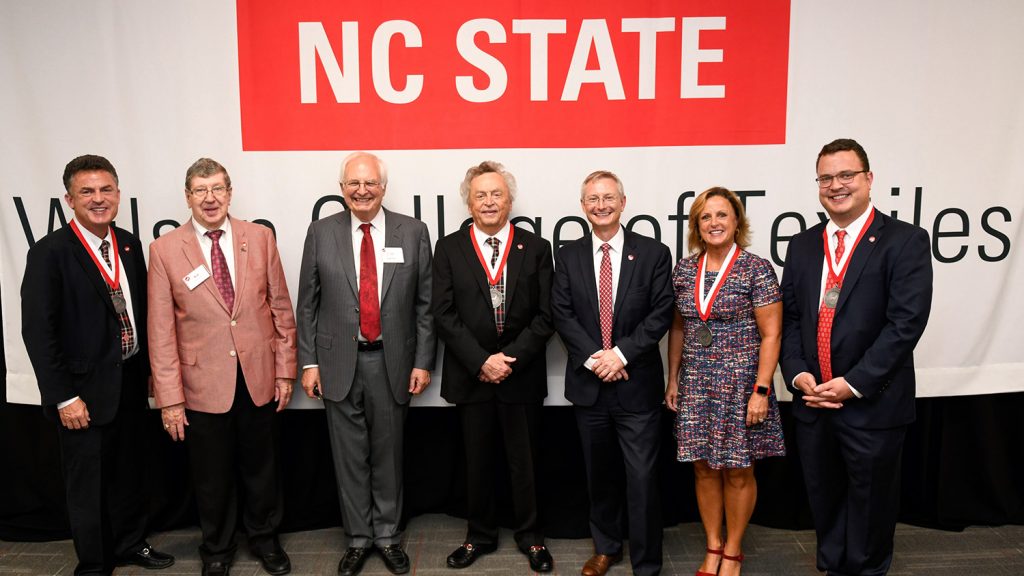
Through the rise of synthetic fibers, globalization and automation, the college has adapted and evolved. Today, it advances a commitment to environmental stewardship and economic sustainability, and its interdisciplinary research teams address textiles challenges and applications that range from protecting first responders and members of the armed services, to filtering the air people breathe and the water they drink.
“The current strength of the college exists because of the hard work and creativity of talented leaders, faculty and staff members, students and passionate alumni over many decades. It is also due to the impact of the North Carolina Textile Foundation, which, since 1942, has pursued the singular mission of supporting the college,” said David Hinks, dean of the Wilson College of Textiles.
The Wilsons’ gift illustrates one of the college’s core values, connectedness, Hinks said, and ensures that the college will continue to develop talent, build vital partnerships and attract jobs to the state.
“Everyone in the college will forever be grateful to the extraordinary Wilson family for their generosity and passion for supporting NC State University,” Hinks said.
Deep Connections in Textiles
Similar to the college, the Wilson family enjoys deep roots in North Carolina, as well as an outlook focused on staying ahead of the curve and connecting with people.
Fred Wilson Sr. started Piedmont Chemical Industries to support the local textile industry. It’s now a global firm with five production sites in North Carolina, South Carolina and Tennessee, additional manufacturing partners serving the Caribbean, Central America and Asia, and a diversified portfolio of products.
Fred Sr. began working part-time in a hosiery mill at a young age, like many of his neighbors and family members. Without the opportunity to attend college, he started teaching himself about textile chemicals at night. He absorbed knowledge from everyone he could.
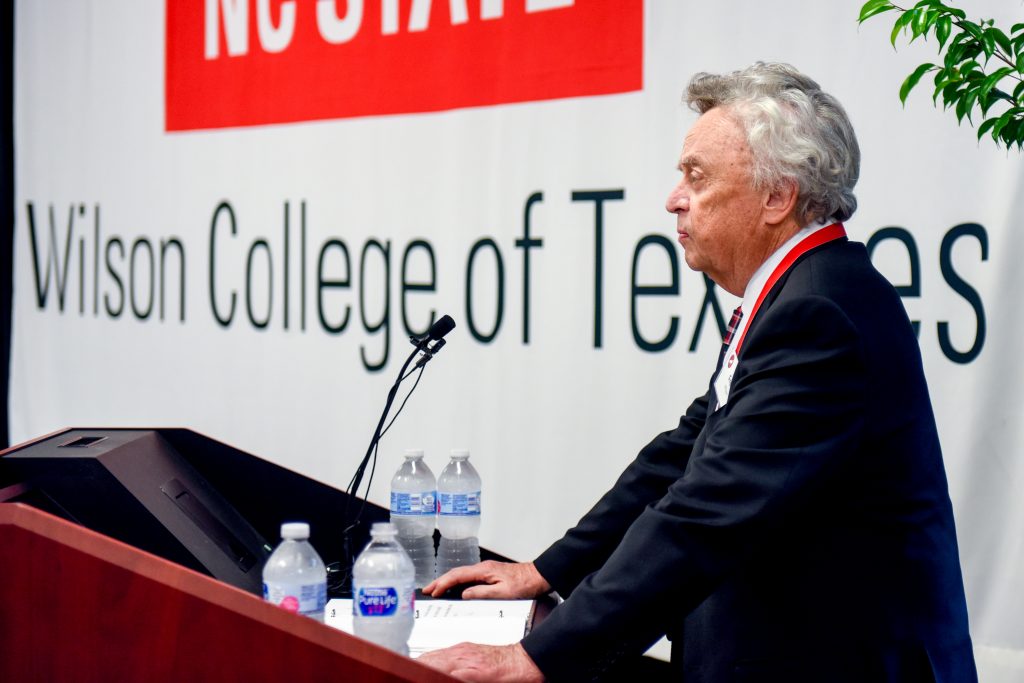
At one point, Fred Sr. attended an educational program at the then-School of Textiles. The experience made a tremendous difference, particularly because he maintained a correspondence with one of the instructors.
“When Dad had a question, this man on the faculty there would respond and help him. So there had been this connection with State College that was important when my father was starting out,” Fred Wilson Jr. said. “He used to say that he started with a tin shack, a barrel and a boat paddle. In the evenings he would mix dyes, and then he would go out and sell to mills during the day.”
Following a successful stint as a salesman with a Brooklyn, New York, company, the senior Wilson decided that his family and friends could do textile dyes better. He opened first in Thomasville with a staff that featured his sister keeping the books; Piedmont Chemical has remained a family business that also currently includes William Davis, Cres Wilson Calabrese’s son and a College of Charleston graduate.
“Thank you to the Wilson family for supporting our vision, and for making this extraordinary commitment.” — Chancellor Randy Woodson
“My dad worked hard and he did OK,” Fred Wilson said. “He was very much a product of the 1920s and 1930s. His philosophy was never to go home on Friday owing anyone money. When I started at the company, after I graduated from State, at first I would have to convince him that we needed to invest a little money in this or that kind of equipment in order to really move forward. We’ve tried to be successful with honesty and with flexibility.”
Over time, Piedmont Chemical expanded strategically with a strong foundation that served it well, Fred Wilson said. “The knowledge that started years ago in the hosiery mills translates to so many other products, so many things downstream, and the technology continues to advance. When you ask some of those same questions about chemistry that we’ve always asked, they can take you in really different directions today in textiles and other areas like agriculture, too,” he added.
NC State’s Think and Do the Extraordinary Campaign continues to gain momentum and help the university unleash its potential, said Brian Sischo, vice chancellor for university advancement.
“Donors are responding to our ambitious $1.6 billion goal with support for scholarships, endowed faculty positions, new facilities and so much more,” Sischo said. “This naming gift is a game-changer for the College of Textiles. We thank the Wilsons for their commitment and for setting such an extraordinary example of philanthropy.”
